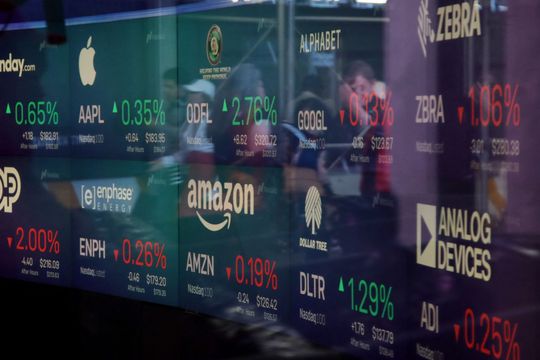Tesla shares finish up by 3.2% after long-awaited arrival of first Cybertruck
The S&P 500 and Nasdaq Composite closed at 15-month highs on Monday, while Dow industrials notched a sixth straight session of advances, as stock investors shook off disappointing data on China’s economy that had curtailed risk appetite earlier in the day.
Meanwhile, investors geared up for a busy week of second-quarter corporate results.
What happened
- The Dow Jones Industrial Average DJIA, +0.22% ended up by 76.32 points, or 0.2%, at 34,585.35. That was its highest close since Nov. 30, 2022, according to Dow Jones Market Data.
- The S&P 500 SPX, +0.39% closed up by 17.37 points, or 0.4%, at 4,522.79. That’s the highest closing level for the S&P 500 since April 5, 2022.
- The Nasdaq Composite COMP, +0.93% finished up by 131.25 points, or 0.9%, at 14,244.95. That’s the highest closing level for the Nasdaq since April 4, 2022.
Last week, the Dow rose 2.3%, the S&P 500 gained 2.4%, and the technology-heavy Nasdaq Composite jumped 3.3%. Dow industrials and the Nasdaq each saw their biggest weekly percentage gains since March, while the S&P 500 booked its best week since mid-June, according to Dow Jones Market Data.
What drove markets
Wall Street began on a somewhat tentative start to the week after disappointing news from China fostered a cautious tone across global markets.
Data showed the world’s second-largest economy grew by only 0.8% in the second quarter compared with the previous three months, slowing sharply from a 2.2% rise in the first quarter. Growth was 6.3% year-over-year, below forecasts.
As the session wore on, however, stock investors chose to focus on the brighter side of U.S. prospects, while holding out hope that China’s softer data may translate into more stimulus from Beijing. On Friday, a senior official at China’s central bank, Liu Guoqiang, said policy makers could use their tools, such as the reserve requirement ratio (RRR) and medium-term lending facility, as needed to weather challenges.
“I would describe this market as having a very ‘Goldilocks’ domestic view on where things are going,” said Michael Reynolds, vice president of investment strategy at Glenmede, which oversees $41.5 billion in assets from Philadelphia. “Investors are getting excited about whether we could get immaculate disinflation, or inflation coming back to the Fed’s 2% target while avoiding a recession. Whether that happens is something else.”
Even after China’s disappointing data on Monday, “there’s a pretty big focus on the domestic economy right now and investors are of the view that China’s government is going to step in with stimulus to get the country’s economy going,” Reynolds said via phone.
A risk-off mood could be seen in industrial commodities sensitive to perceptions of Chinese demand, with oil futures CL.1, 0.36% declining for a second straight session and copper HG00, 0.05% also ending lower.
Meanwhile, the U.S. second-quarter earnings season faces a somewhat quieter session on Monday after Friday’s big bank kickoff. FB Financial FBK, +4.64% and Home Bancorp. HBCP, -0.73% are among those delivering their results after the market closes.
The next few days are nonetheless stuffed with potential market catalysts, analysts said. More earnings reports will come at a brisk pace this week, with updates from the likes of Tesla TSLA, +3.20%, Morgan Stanley MS, +0.69%, Goldman Sachs GS, +0.31%, Netflix NFLX, +1.84% and Bank of America BAC, +1.00%. On the economic calendar, Tuesday’s U.S. retail sales will provide more color about the behavior of the vitally important consumer.
Stocks had rallied last week after a sharper-than-expected slowdown in inflation reflected in June data on consumer and producer prices. The data reinforced expectations the Federal Reserve is near the end of its rate-hike cycle. But some market watchers argued the rally, which has pushed the S&P 500 higher by 17.8% this year, has gone too far too fast.
“Key inflation categories like shelter and wages remain uncomfortably high, for example, so if we see only one (or two) additional rate hikes, prudent investors may want to cast a skeptical eye on overly exuberant rallies,” said Saira Malik, chief investment officer at Nuveen in New York, in a note.
“Additionally, in our view, the higher-for-longer interest rate environment has likely set the stage for a mild recession sometime in 2024 (our base case). Looking at S&P 500 corporate earnings as a gauge, analyst estimates continue to be revised lower for both the second quarter of 2023 and the full year,” Malik wrote.
On Monday, Treasury Secretary Janet Yellen sounded an optimistic note on the prospect of avoiding a recession, citing the strength of the U.S. labor market and “encouraging” inflation data. “I don’t expect a recession,” Yellen said in a Bloomberg Television interview, speaking from India on the sidelines of a Group of 20 finance officials’ meeting.
The New York Fed’s Empire State business conditions index, a gauge of manufacturing activity in the state, fell 5.5 points in July to 1.1, the regional Fed bank said Monday. Economists had expected a flat reading, according to a survey by The Wall Street Journal. Any reading above zero indicates improving conditions.
Companies in focus
- Shares of Activision Blizzard Inc. ATVI, +3.49% ended up by 3.5% after a federal appeals court denied the Federal Trade Commission’s bid to temporarily block Microsoft Corp.’s MSFT, +0.14% acquisition of the videogames maker. Microsoft shares finished up by 0.1%.
- Tesla Inc. shares closed up by 3.2% after the company’s first Cybertruck rolled off the assembly line on Saturday in Austin, Texas, following years of delays.
- Rivian Automotive Inc. RIVN, -3.34% shares finished down by 3.3% after the Tesla news. “We see competitive pricing and specs for the Cybertruck as a fundamental and headline risk to [Rivian],” Baird analyst Ben Kallo wrote in a note to clients.
- Shares of Ford Motor Co. F, -5.94% ended down by 5.9% after the automaker said it was cutting prices on its F-150 Lightning electric trucks by as much as 17% for some models.

